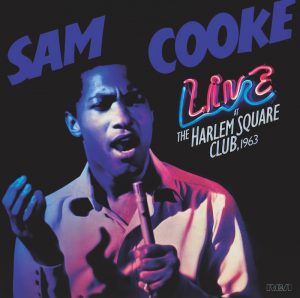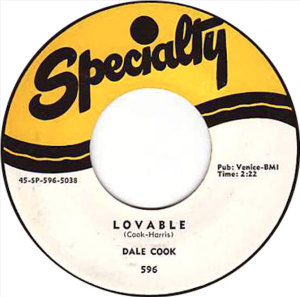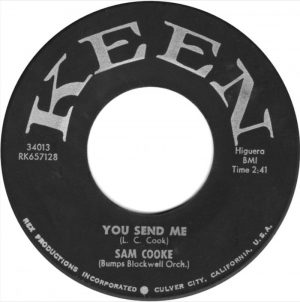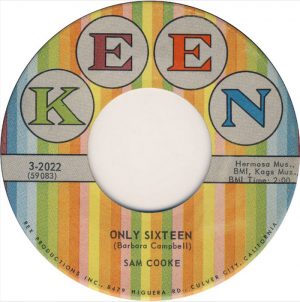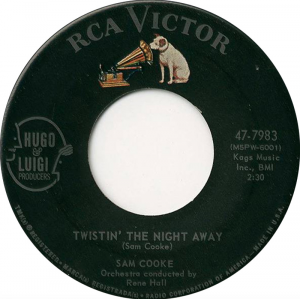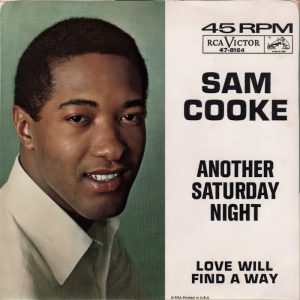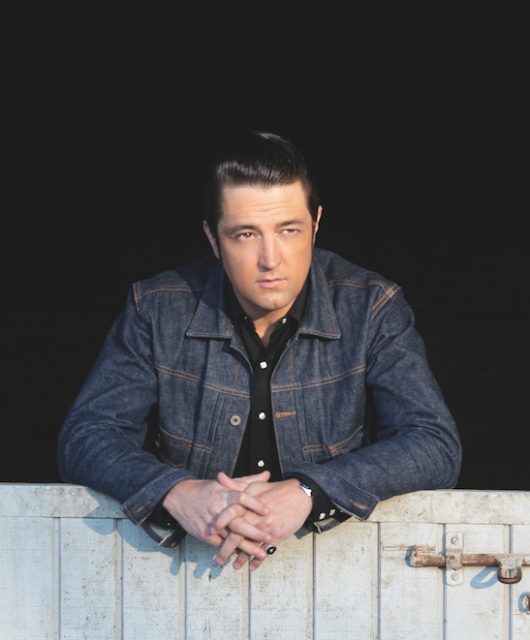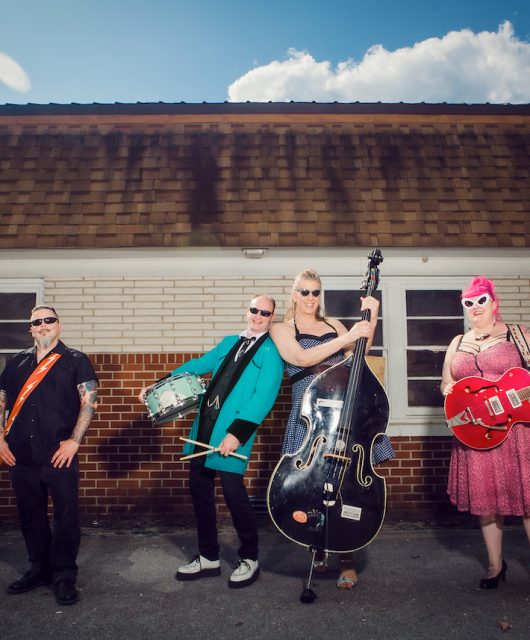A sublime singer and visionary poet, Sam Cooke bridged divides to shake the world. With help from his daughter Carla Cooke and the Rock And Roll Hall Of Fame, Vintage Rock marked the 60th anniversary of his untimely passing by celebrating a rock’n’soul legacy which continues to inspire today.
Widely celebrated as ‘The King of Soul’, there is no questioning Sam Cooke’s immeasurable influence on rock’n’roll. His velvet vocals and groundbreaking anthems played a revolutionary role in reshaping the course of music history. Indeed, the impact of his rock-infused soul packed such a powerful punch, that even the newly crowned heavyweight champion of the world, Cassius Clay, interrupted his chaotic post-fight interview in 1964 to single out his friend: “This is Sam Cooke!” hollered the King Of The Ring, “This is the world’s greatest rock’n’roll singer… We gonna shake up the world!”
Both titans certainly left a seismic impression on their individual fields. While the soon-to-be Muhammad Ali would go down in history as boxing’s greatest, Cooke would be celebrated as a musical pioneer, who merged the emotional depth of gospel with the infectious energy of rock’n’roll to formulate a sound that resonated with all colours and creeds. Evocative hits such as Twistin’ The Night Away, Only Sixteen, Cupid, Wonderful World, Chain Gang and Another Saturday Night, perfectly showcase Cooke’s mastery of rock’s rhythmic vitality and remain just as potent today as they did 60 years ago before his premature passing.
Tremendous Vision
Such was his impact, the Rock And Roll Hall Of Fame could not overlook his essential contribution when it debuted in 1986. Alongside such luminaries as Elvis Presley, Little Richard, Fats Domino, The Everly Brothers, Buddy Holly, Jerry Lee Lewis and Chuck Berry, Cooke was included in its inaugural list.
“Sam Cooke was inducted in our very first class because he is a giant,” reveals Greg Harris, the CEO of the Rock And Roll Hall Of Fame, to Vintage Rock. “In what was sadly a very short career, he had a massive impact. Of course, his work with the gospel group Soul Stirrers alone was dynamic and had such an important influence on rock’n’roll, but his secular music is off the charts, and he was one of the earliest artists that wrote his own songs. Not only did he enjoy tremendous commercial success, but he also established his own label and was really running the business side of things, too. To set up a publishing company and have the vision to control your own career was very rare in that era.
Unbelievable Catalogue Of Songs
“Ultimately, underneath all of it, we still remember the songs. They are unbelievable. Over the course of his solo career, he placed countless singles in the US Top 40 and his anthems had such a dramatic impact and influence.
“I believe he played a massive role in the evolution of rock’n’roll. He wanted to appeal to a wide audience and found a way to reach everybody while staying true to himself. So, if you look at the artists that came after him – Otis Redding, James Brown, Rod Stewart, Tina Turner, Mick Jagger, Al Green, Diana Ross, Marvin Gaye, the list goes on – they all owe a huge debt to Sam Cooke. My guess is that he would be thrilled that he’s still so revered and that the Hall Of Fame recognised him alongside the likes of the legends in that first class. I think all those other artists would have been honoured to be associated with Sam Cooke, too. I bet they all listened to the Soul Stirrers and always looked to see what he was going to do next.”
Soul Stirring
Born Samuel Cook in Clarksdale, Mississippi, in 1931, Sam was the fifth of eight children of Baptist minister Rev. Charles Cook and Annie Mae Cook. Moving to Chicago in 1933, the future star absorbed the gospel music that surrounded him.
“Sam was always ambitious,” his younger brother L.C. observed with Peter Guralnick, author of Dream Boogie: The Triumph Of Sam Cooke. “He always knew exactly what he wanted to do… ‘I’m gonna sing and I’m going to make me a lot of money’… I thought I had a personality, but Sam could charm the birds out of the trees.”
Indeed, many years later at the height of his fame, in a 1964 interview on The Mike Douglas Show, that effervescent charisma sparkles when the genial host asks for a capsule version of the Sam Cooke story…’ “The capsule version,” smiles Cooke, “Born. My father was a minister. I started singing in the church, naturally, because I was exposed to gospel singing first. Came out of school, went with a professional group called the Soul Stirrers, sang around the country with them for about five years. Decided to go on my own. Made a song called You Send Me. It sold a million-and-a-half copies for me, luckily enough I went into the Copa and bombed…” “Why do you think you bombed?” interjects fellow guest Eleanor Harris. “I know why I bombed,” Sam responds, “because I wasn’t ready.”
Miami Spice
To get a true representation of Cooke live, one only need listen to one of the greatest live LPs ever made, Live At The Harlem Square Club, 1963. Recorded at a small downtown nightspot in a Black Miami neighbourhood, this short sweat-drenched set of his R&B hits, is sensational.
“My father appealed to all audiences because he sang for everyone,” responds his daughter Carla Cooke. “But you hear him in his raw element and, oh my, it is phenomenal. He was one of the first artists that would not sing to segregated audiences because he wanted to be universal – anybody could relate to the songs he wrote.”
Carla is quick to observe that, unlike a James Brown or Jackie Wilson, Sam would always let the music do the talking. “He could just stand there and touch your soul in such an amazing way he didn’t have to do all that dancing around. My father captured your heart from the moment he opened his mouth. ”
He’s So Wonderful
So, while Cooke might not yet have fully mastered how to perform for a well-to-do white audience at New York’s Copacabana in 1958, the singer had firmly established himself as a star on the gospel circuit more than a decade earlier. As the handsome lead teenage vocalist with celebrated Chicago outfit the Highway Q.C.’s, Cooke was the main attraction. “The Q.C.’s were the best group I ever heard in my life,” L.C. told Guralnick. “Those cats could go into a church, and that church would be full of kids. Sam brought those kids to church. See, Sam revolutionised everything.”
Soon enough it wasn’t just the ladies in the audience that were touting for his attention. Rival group The Soul Stirrers were on the lookout for a replacement for their lead singer Rebert Harris and approached the prestigious young talent. While the mere thought of leaving the Q.C.’s compromised the sense of honour that was instilled into him by his father, it wouldn’t be the last time that Sam felt torn when making a life-changing decision.
Joining the Stirrers, who were signed to Art Rupe’s Specialty Records, Cooke fronted the group on their single Jesus Gave Me Water, which landed a major hit for the collective. Witness to the impact Cooke was having on the gospel scene was a young Bobby Womack, who recounted to Guralnick: “Sam brought a whole new element to gospel. He started bringing young people into the church to the point where it was like a rock’n’roll show… We were sad that he had to leave the fold.”
For Cooke, more change was, inevitably, gonna come…
The Perfect Package
“Sam was a thinker,” revealed L.C. to Guralnick. “[Sam] could see the whole picture. He didn’t go by anyone else and did things exactly the way he wanted. He had the looks, and the personality, the education – Sam had it all.”
The perfect package, a young Cooke eventually decided to switch from spiritual to secular music as a solo artist. However, despite Sam receiving the blessing of his father who had said, “It isn’t what you sing that is so important, but rather the fact that God gave you a good voice to use… he must want you to make people happy,” the transition was still a troubling one for Cooke. Fearing a backlash and possible accusations of blasphemy, his first attempt on the mainstream pop market was Lovable, a glorious reworking of He’s So Wonderful, released under the pseudonym ‘Dale Cook’ through Specialty.
Charming A Nation
The name change fooled no one as Cooke’s sumptuous voice was unmistakable. Still, the release received little in the way of chart action and, following a falling out with Rupe, Cooke would find a new home with Keen Records – a move which immediately proved prudent for owners John and Alex Siamas.
Cooke’s self-penned debut single for his new label, You Send Me, was an immediate Billboard smash, aided perhaps fortuitously by an appearance on The Ed Sullivan Show. The last act scheduled to appear during an overrunning broadcast on 3 November 1957, a suave Sam strolled out singing the opening lines as the live programme promptly stopped airing, cutting the singer off in his prime. Inundated with complaints, Cooke was invited back to complete his performance on 1 December 1957. Charming a nation, the young star swiftly found himself at No.1.
Thrust into the spotlight, he made that aforementioned appearance at the Copa where a disastrous set of ill-fitting numbers fell flat. Within a year, though, he was back riding high in the charts, with Everybody Likes To Cha Cha Cha, seemingly perfectly tailored for the audience he had faced at the Copa that devastating night. He enjoyed further success with timeless tracks such as Only Sixteen and Wonderful World, before RCA Victor started courting Cooke.
King Of Rock’n’Soul
Signing to the label, home to Elvis Presley, The King Of Soul was an instant challenger to the King Of Rock’n’Roll. His Chain Gang peaked in the US Hot 100 at No.2 and was followed by further classics such as Cupid (No.17), Twistin’ The Night Away (No.9), Bring It On Home To Me (No.13), Nothing Can Change This Love (No.12) and Send Me Some Lovin’ (No.13). Cooke soon established himself as the second biggest moneymaker on RCA’s books behind Presley. Despite being ‘competition’ there was a mutual respect. L.C. told Guralnick how, “Elvis shook my hand and told me he loved my brother – he knew his gospel music – and he talked to me for 20 minutes about Sam.”
Many similarities can be drawn between Sam and Elvis. Both were born into poor Mississippi families, found inspiration in their deep-rooted love of gospel music, and both would cut two of the most compelling tracks of the era in A Change Is Gonna Come and If I Can Dream. However, unlike his white counterpart, Cooke not only penned many of his best-loved hits he was also firmly in control of his own destiny. There was no mercurial manager controlling his every move and, having registered six Top 30 singles (three within the Top 10) on the British hit parade, Cooke attracted the attention of the UK’s top pop promoter Don Arden. In 1962 the singer, unlike Elvis, got to head out across the pond to charm Anglo audiences with his soul-laced scorchers alongside another VR favourite, Little Richard.
Twistin’ The Night Away
Following a religious awakening in 1957, the Architect Of Rock’n’Roll repented his wild piano-pounding ways and fully embraced the word of God. His dramatic spiritual rebirth resulted in a string of albums like Pray Along With Little Richard and The King Of The Gospel Singers. Having turned his back on secular music, Richard’s opening performance at Doncaster’s Gaumont, could not have surprised the rock’n’roll crowd more. With Cooke delayed in Germany, The Georgia Peach took to the stage, Bible in hand and wearing robes, to perform a set consisting purely of gospel numbers. Greeted by an apathetic audience, the NME’s Chris Hutchins wrote: “It seemed we were something short of the great artist who once rocked the world.”
On Cooke’s arrival, Arden pleaded for Sam to try to intervene. Richard, who had much respect for his touring partner, was suitably charmed by his persuasive powers and agreed to shake up his set and would go on to deliver an all-killer, no-filler roof-raising rock’n’roll experience. Every night of the tour thereafter was simply electrifying. Acting as an impromptu surprise guest, Gene Vincent would belt out Be-Bop-A-Lula before introducing the stars, while opening act Jet Harris watched and learned.
In an NME interview with Hutchins, Cooke said: “I want to see lots more of this wonderful country. No kidding, I’m just crazy about the audiences I’ve had here. We had no idea what they were going to be like, of course, and to be honest with you, I was just a little apprehensive before the tour got under way. I haven’t had all that time to get around, but I must see Buckingham Palace and a few castles before I go back! The trip wouldn’t be complete without that.”
Enduring Hits
While he may not have seen much of the UK, other than a string of lonely hotel rooms, at least one sleepless night in London allowed the frustrated star an opportunity to dream up one of his most enduring hits. Another Saturday Night, recorded on his return to California in February 1963, burst into the upper echelon of the US charts, but would be the last Top 10 in his lifetime… On 11 December 1964, at the Hacienda Motel in South Central, Los Angeles, he was shot and tragically killed. He was just 33 years old.
The sudden death of Cooke sent shockwaves around the world. Speaking out over the lack of a thorough police investigation, Cassius Clay, now rechristened Muhammad Ali on converting to the Nation of Islam, angrily said: “If Cooke had been Frank Sinatra, The Beatles or Ricky Nelson, the FBI would still be investigating.”
Long Time Coming
Following a hectic funeral service in Chicago, where a reported 200,000 fans waited in line to view his body, Sam Cooke was duly laid to rest in Los Angeles where a second service witnessed a stirring performance of The Angels Keep Watching Over Me by Ray Charles.
However, the Sam Cooke story does not conclude here. Having debuted his track A Change Is Gonna Come on Johnny Carson’s Tonight Show on 7 February 1964, it was posthumously released as the B-side to Shake, 11 days after his death.
The track has become an anthem for the Civil Rights Movement and is today regarded as one of the greatest songs of all time. Indeed, the words “a change is gonna come” feature on a wall of the Contemplative Court in the Smithsonian’s National Museum of African American History and Culture.
As Greg Harris notes: “A Change Is Gonna Come has gone far beyond Billboard to exist in broader culture. It has significant meaning and is still a powerful call to action today. It’s not a nostalgic song, it’s very much alive, and unfortunately is as relevant today as it was then.
“That song to me, if I’ve heard it a thousand times, still evokes the same emotion. I think there’s millions of people that feel the same way. All of the power that’s been imbued in that song over the last six decades is so massive and A Change Is Gonna Come is one of those one in a million pieces. But when you combine that with everything else he did – all the other hits and all the other artists he influenced – his legacy is amazing. It’s like a big tree and Sam’s the trunk from which all these roots and branches grow.”

Celebrating A Legacy
Today this tremendous legacy is preserved on stage by Carla Cooke, the daughter of Sam and Jenny Parks, who connects with her father through his music in her show, The Sam Cooke Experience. “My father passed away when I was four months old,” Carla tells us. “The memories that I have are those that have been shared by friends and family members like my uncle L.C.
“As a child I used to constantly listen to his music, and it has always been a part of my soul. To perform my father’s music today is incredible and I feel him on stage with me every time. I love feeling his presence. It’s just amazing that I can still do this at 60 and keep my father’s legacy alive. His fans, young and old, are always so happy to meet me and to share their stories. I love to hear about what his music means to them.”
Taking Care Of Business
With his eyes always set on the bigger picture, both musically and within the industry, Sam Cooke started his own label, SAR Records, with J. W. Alexander and manager, Roy Crain, before he created the publishing imprint and management company Kags Music. Not necessarily concerned about turning a profit, he used his status as a vehicle to showcase undiscovered Black talent including a latter-day version of The Soul Stirrers, keyboard wizard Billy Preston as well as Bobby Womack’s group The Valentinos.
Does Carla think Sam would have given up singing to focus on business, or even move into politics? “I have talked about this with one of L.C.’s best friends,” she replies. “We think that he probably would have got into politics and I still believe that he would have grown his label because he was the first Black artist to own his own music label and record different artists.
“He loved seeing other people get their just dues in the music business and would have done that first before moving on to politics. He would never have given up performing because it was so deeply rooted into his soul. Sam was always writing songs, and I think he would have used music to talk about what was going on in the world.”
Timeless Inspiration
So, does Carla have a personal favourite track to sing live? “Oh, I love performing all his songs,” smiles Carla. “But A Change Is Gonna Come is a special one for me and I know it’s close to so many people’s hearts. It such a significant song and people are always waiting to hear me sing that one. Even though it came out in 1964, people can still relate to that particular song today. It had such an impact and is just so profound. It touches on every sense of racism and what we need to do to become an entire race.
“Every time I listen to his music, I catch different phrases and things he does with his voice. Many people have tried to imitate him, but they can’t because he is so very distinctive, especially when he sings and his mannerisms. There is only one Sam Cooke and you can’t compare him to any other voice – past, present, or future – he truly was an original innovator. Even though I’m his daughter, I’m still in awe. Just to hear his voice is inspiring.”
“I get such a good feeling inside knowing that today, 60 years after his death, he is still celebrated. He was voted the third best all-time singer by Rolling Stone, so he’s still up there. I love it and I know that he would love it, too!
“His legacy cannot be touched by anyone. I think 60 years into the future, people will still be talking about Sam Cooke and what an impact he made on everyone. He is beloved by so many and no one can take that away. As long as people are listening to music, they’ll be listening to Sam Cooke.”
Visit Carla Cooke’s official website here
Read More: Rock’n’Roll Heroes – Jackie Wilson


